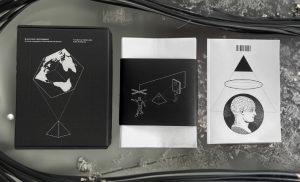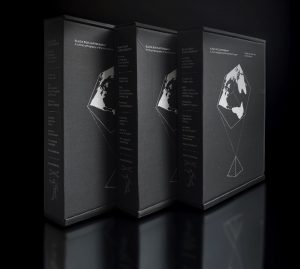
We, Krisis Publishing, an independent publishing and curatorial platform, based in Brescia, Italy, are proud to introduce our new publication Black Box Cartography. A Critical Cartography of the Internet and Beyond by Vladan Joler. With texts and contributions by Vladan Joler, Kate Crawford, Matteo Pasquinelli, Daphne Dragona and SHARE Lab.
The book will be published on October 25, 2023. Price: 50 euros.
In our AI-driven world, understanding the hidden mechanics of our digital surroundings is crucial. Vladan Joler, with the support of experts, deciphers the complex web of technologies that influence our daily lives.
Drawing inspiration from critical cartography, Joler’s work attempts to give visibility to the unseen. From deciphering Facebook’s behind-the-scenes algorithmic operations to elucidating the multifaceted structure of emerging extraction models, Joler’s methodologies offer us a deep dive into the technological universe. That’s how a household device like the Amazon Echo is unravelled to shed light on larger issues of resource exploitation, digital extractivism, and AI classification systems.
Black Box Cartography showcases, together for the first time, four works by Vladan Joler: Facebook Algorithmic Factory, Anatomy of an AI System, Nooscope Manifested and New Extractivism. The limited edition boxset includes 4 large-scale posters and a book collecting critical essays and contributions by theorists Kate Crawford, Matteo Pasquinelli and Daphne Dragona.
Edited by Vladan Joler, Francesco D’Abbraccio & Andrea Facchetti
Table of Contents
MAPPING EXPLOITATION / EMPOWERING KNOWLEDGE
Daphne Dragona
FACEBOOK ALGORITHMIC FACTORY Blueprints of the algorithmic black box Vladan Joler and SHARE Lab
ANATOMY OF AN AI SYSTEM
The Amazon Echo as an anatomical map
of human labour, data and planetary resources Vladan Joler and Kate Crawford
THE NOOSCOPE MANIFESTED
AI as instrument of knowledge extractivism Vladan Joler and Matteo Pasquinelli
NEW EXTRACTIVISM
An assemblage of concepts and allegories Vladan Joler
In recent years, our online environment has become increasingly populated by artificial agents of various forms. Our ability to understand and investigate such systems is becoming increasingly important as more and more processes in our lives are moderated by AI-based technologies and complex algorithms. However, our understanding of them is still extremely limited.
Over the past few years, Vladan Joler has been working (with the help of a network of data analysts, media theorists and cyber forensic experts) to bring to light some of the hidden layers of these systems. From the invisible algorithmic factory of Facebook to the visual and conceptual assemblage of a new extraction model, Joler’s representational tactics take us into the depths of today’s technological ecosystems. Drawing on the tradition of critical cartography, his maps attempt to unfold the black box of digital infrastructures. Thus, a seemingly simple and innocuous device like the Amazon Echo reports on the exploitation of natural and human resources, material and immaterial forms of extractivism, AI taxonomy and classification systems.
Bios
Vladan Joler is the director of the SHARE Foundation and a professor at the New Media Department of the University of Novi Sad. SHARE Lab is a research and data investigation lab for exploring different technical and social aspects of algorithmic transparency, digital labour exploitation, invisible infrastructures, black boxes, and other contemporary phenomena at the intersection of technology and society. Joler’s work is included in the permanent collections of the Museum of Modern Art (MoMA) in New York City, the Victoria and Albert Museum, the Design Museum in London, and the permanent exhibition of the Ars Electronica Center in Linz. His work has been exhibited in more than a hundred international exhibitions, including institutions and events such as ZKM, XXII Triennale di Milano, HKW, Vienna Biennale, V&A, Transmediale, Ars Electronica, the Council of Europe in Strasbourg and the European Parliament in Brussels. Joler’s work has been profiled and covered in many international media such as BBC, CNN, WIRED, The Independent, The Times, Wallpaper*, Le Figaro, The Verge, Fast Company, +ARCH, ArtForum, Neural, LesJours, WeMakeMoneyNotArt and many others.
Daphne Dragona is an independent curator and writer based in Berlin. In her work, she addresses issues such as the ambiguities of connectivity, the challenges of the commons, and the role of technology in times of climate crisis. Her exhibitions have been hosted at the real or virtual premises of Onas- sis Stegi, LABoral, Aksioma, EMST (National Museum of Contemporary Art Athens), Akademie Schloss Solitude and other institutions. Dragona was part of the core curatorial team of the Transmediale festival between 2015 and 2019. She holds a PhD from the Faculty of Communication & Media Studies of the University of Athens.
Krisis Publishing is the editorial project of Krisis, a collective composed of practitioners and researchers working in the field of politics of representation. Krisis Publishing develops editorial and audio-visual projects questioning how visual and media cultures affect contemporary society. Krisis Publishing recently edited and published, Entreprecariat (2018), Adversarial Feelings (2019), Design & Conflicts. Vol.1 (2019), James Ballard – All that mattered was sensation (2019), AI&Conflicts. Vol.1 (2020), Il corpo virtuale (2022), Ecologia come testo, testo come ecologia (2023).
Excerpts
Every one of these maps is an attempt to visualize processes that have been carefully studied along with relations of communication or infrastructural power involved in today’s use of networks. The maps capture the era they were designed in and the main topics addressed; they capture the need to address the complexity and opacity of algorithmic systems. They are tools of knowledge and artistic gestures at the same time. – D. Dragona
Within those invisible walls, in every moment algori- thms are deciding which information will appear in our infosphere, how many and which of your friends will see your posts, what kind of content will become part of your reality and what will be censored or deleted. – Facebook Algorithmic Fabric
With each interaction, Alexa is training to hear better, to interpret more precisely, to trigger actions that map to the user’s commands more accurately, and to build a more complete model of their preferences, habits and desires. What is required to make this possible? Put simply: each small moment of convenience – be it answering a question, turning on a light, or playing a song – requires a vast planetary network, fueled by the extraction of non-renewable materials, labor, and data. – Anatomy of an AI System
The purpose of the Nooscope map is to secularize AI from the ideological status of “intelligent machine” to one of knowledge instruments. Rather than evoking legends of alien cognition, it is more reasonable to consider machine learning as an instrument of knowledge magnification that helps to perceive features, patterns, and correlations through vast spaces of data beyond human reach.– The Nooscope Manifested
The prisoner is standing in the middle of the cave facing the interface. Interfaces are framing and structuring the projected algorithmic spectacle of images. The interface is the office cubicle of immaterial labour. Even though they are a direct manifestation of rules, regulations and taxonomies, they successfully obscure what is hidden beneath them. They define directly or indirectly what we can or cannot do. — New Extractivism
https://www.krisispublishing.com
krisis@krisispublishing.com


